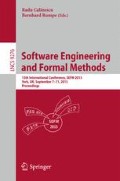Abstract
Correctness of UML class diagrams annotated with OCL constraints can be checked using bounded verification, e.g. SAT solvers. Bounded verification detects faults efficiently but, on the other hand, the absence of faults does not guarantee a correct behavior outside the bounded domain. Hence, choosing suitable bounds is a non-trivial process as there is a trade-off between the verification time (faster for smaller domains) and the confidence in the result (better for larger domains). Unfortunately, existing tools provide little support in this choice.
This paper presents a technique that can be used to (i) automatically infer verification bounds whenever possible, (ii) tighten a set of bounds proposed by the user and (iii) guide the user in the bound selection process. This approach may increase the usability of UML/OCL bounded verification tools and improve the efficiency of the verification process.
Access this chapter
Tax calculation will be finalised at checkout
Purchases are for personal use only
References
Anastasakis, K., Bordbar, B., Georg, G., Ray, I.: On challenges of model transformation from UML to Alloy. Softw. Syst. Model. 9(1), 69–86 (2010)
Apt, K.R., Wallace, M.: Constraint Logic Programming using ECLiPSe. Cambridge University Press, New York (2007)
Balaban, M., Maraee, A.: Simplification and correctness of UML class diagrams – focusing on multiplicity and aggregation/composition constraints. In: Moreira, A., Schätz, B., Gray, J., Vallecillo, A., Clarke, P. (eds.) MODELS 2013. LNCS, vol. 8107, pp. 454–470. Springer, Heidelberg (2013)
Berardi, D., Calvanese, D., Giacomo, G.D.: Reasoning on UML class diagrams. Artif. Intell. 168(1–2), 70–118 (2005)
Bordeaux, L., Katsirelos, G., Narodytska, N., Vardi, M.Y.: The complexity of integer bound propagation. J. Artif. Intell. Res. (JAIR) 40, 657–676 (2011)
Cabot, J., Clarisó, R., Riera, D.: On the verification of UML/OCL class diagrams using constraint programming. J. Syst. Softw. 93, 1–23 (2014)
Choi, Y., Heimdahl, M.: Model checking software requirement specifications using domain reduction abstraction. In: ASE 2003, pp. 314–317. IEEE (2003)
Feinerer, I., Salzer, G., Sisel, T.: Reducing multiplicities in class diagrams. In: Whittle, J., Clark, T., Kühne, T. (eds.) MODELS 2011. LNCS, vol. 6981, pp. 379–393. Springer, Heidelberg (2011)
Galeotti, J.P., Rosner, N., Pombo, C.G.L., Frias, M.F.: Taco: efficient SAT-based bounded verification using symmetry breaking and tight bounds. IEEE Trans. Softw. Eng. 39(9), 1283–1307 (2013)
González, C.A., Cabot, J.: Formal verification of static software models in MDE: a systematic review. Inf. Softw. Tech. 56(8), 821–838 (2014)
Kuhlmann, M., Gogolla, M.: From UML and OCL to relational logic and back. In: France, R.B., Kazmeier, J., Breu, R., Atkinson, C. (eds.) MODELS 2012. LNCS, vol. 7590, pp. 415–431. Springer, Heidelberg (2012)
Queralt, A., Teniente, E.: Verification and validation of UML conceptual schemas with OCL constraints. ACM TOSEM 21(2), 13:1–13:41 (2012)
Rosner, N., Galeotti, J.P., Lopez Pombo, C.G., Frias, M.F.: ParAlloy: towards a framework for efficient parallel analysis of alloy models. In: Frappier, M., Glässer, U., Khurshid, S., Laleau, R., Reeves, S. (eds.) ABZ 2010. LNCS, vol. 5977, pp. 396–397. Springer, Heidelberg (2010)
Seiter, J., Wille, R., Soeken, M., Drechsler, R.: Determining relevant model elements for the verification of UML/OCL specifications. In: DATE 2013, pp. 1189–1192. EDA Consortium (2013)
Shaikh, A., Clarisó, R., Wiil, U.K., Memon, N.: Verification-driven slicing of UML/OCL models. In: ASE 2010, pp. 185–194. ACM (2010)
Soeken, M., Wille, R., Kuhlmann, M., Gogolla, M., Drechsler, R.: Verifying UML/OCL models using Boolean satisfiability. In: DATE 2010, pp. 1341–1344. IEEE (2010)
Yu, F., Bultan, T., Peterson, E.: Automated size analysis for OCL. In: FSE 2007, pp. 331–340. ACM (2007)
Author information
Authors and Affiliations
Corresponding author
Editor information
Editors and Affiliations
Rights and permissions
Copyright information
© 2015 Springer International Publishing Switzerland
About this paper
Cite this paper
Clarisó, R., González, C.A., Cabot, J. (2015). Towards Domain Refinement for UML/OCL Bounded Verification. In: Calinescu, R., Rumpe, B. (eds) Software Engineering and Formal Methods. SEFM 2015. Lecture Notes in Computer Science(), vol 9276. Springer, Cham. https://doi.org/10.1007/978-3-319-22969-0_8
Download citation
DOI: https://doi.org/10.1007/978-3-319-22969-0_8
Published:
Publisher Name: Springer, Cham
Print ISBN: 978-3-319-22968-3
Online ISBN: 978-3-319-22969-0
eBook Packages: Computer ScienceComputer Science (R0)

